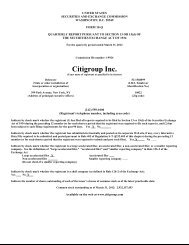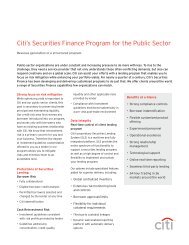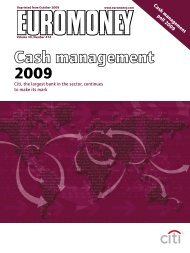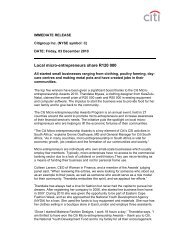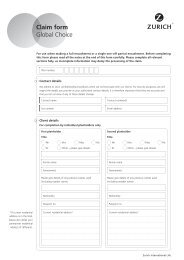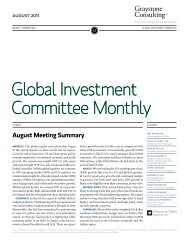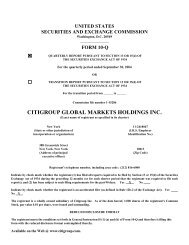Citigroup Inc.
Citigroup Inc.
Citigroup Inc.
You also want an ePaper? Increase the reach of your titles
YUMPU automatically turns print PDFs into web optimized ePapers that Google loves.
RISK FACTORSThe ongoing implementation of the Dodd-Frank Wall StreetReform and Consumer Protection Act of 2010 will require<strong>Citigroup</strong> to restructure or change certain of its businesspractices and potentially reduce revenues or otherwiselimit its profitability, including by imposing additionalcosts on <strong>Citigroup</strong>, some of which may be significant.The Dodd-Frank Wall Street Reform and Consumer Protection Act of 2010(Financial Reform Act), signed into law on July 21, 2010, calls for significantstructural reforms and new substantive regulation across the financialindustry. Because most of the provisions of the Financial Reform Act thatcould particularly impact Citi are currently or will be subject to extensiverulemaking and interpretation, a significant amount of uncertainty remainsas to the ultimate impact of the Financial Reform Act on <strong>Citigroup</strong>, especiallywhen combined with other ongoing U.S. and global regulatory developments.This uncertainty impedes future planning with respect to certain of Citi’sbusinesses and, combined with the extensive and comprehensive regulatoryrequirements adopted and implemented in compressed time frames,presents operational and compliance costs and risks. What is certain is thatthe Financial Reform Act will require <strong>Citigroup</strong> to restructure, transformor change certain of its business activities and practices, potentially limitor eliminate Citi’s ability to pursue business opportunities, and imposeadditional costs, some significant, on <strong>Citigroup</strong>, each of which couldnegatively impact, possibly significantly, <strong>Citigroup</strong>’s earnings.<strong>Inc</strong>reases in FDIC insurance premiums will significantlyincrease Citi’s required premiums, which will negativelyimpact <strong>Citigroup</strong>’s earnings.The FDIC maintains a fund out of which it covers losses on insured deposits.The fund is composed of assessments on financial institutions that holdFDIC-insured deposits, including Citibank, N.A. and <strong>Citigroup</strong>’s otherFDIC-insured depository institutions. As a result of the recent financialcrisis, the Financial Reform Act seeks to put the FDIC fund on a sounderfinancial footing by requiring that the fund have assets equal to at least1.35% of insurable deposits. The FDIC has adopted a higher target of 2.0% ofinsurable deposits.The cost of FDIC assessments to FDIC-insured depository institutions,including Citibank, N.A. and <strong>Citigroup</strong>’s other FDIC-insured depositoryinstitutions, depends on the assessment rate and the assessment base of eachinstitution. The Financial Reform Act changed the assessment base fromthe amount of U.S. domestic deposits to the amount of worldwide averageconsolidated total assets less average tangible equity. The FDIC has adopteda complex set of calculation rules for its assessment rate, to be effectivein the second quarter of 2011. As a result of these changes, <strong>Citigroup</strong>’sFDIC assessments could increase significantly (prior to any potentialmitigating actions), which will negatively impact its earnings. GivenCiti’s substantial global footprint, the change from an assessment basedon <strong>Citigroup</strong>’s relatively smaller U.S. deposit base, as compared to its U.S.competitors, to one related to global assets (including <strong>Citigroup</strong>’s relativelylarger global deposit base as compared to its U.S. competitors) will cause adisproportionate increase in <strong>Citigroup</strong>’s assessment base relative to many ofits U.S. competitors that are subject to the FDIC assessment. The assessmentcould also disadvantage Citi’s competitive position in relation to foreign localbanks which are not subject to the assessment.Although <strong>Citigroup</strong> currently believes it is “wellcapitalized,” prospective regulatory capital requirementsfor financial institutions are uncertain and Citi’scapitalization may not prove to be sufficient relative tofuture requirements.The prospective regulatory capital standards for financial institutions arecurrently subject to significant debate and rulemaking activity, both in theU.S. and internationally, resulting in a degree of uncertainty as to theirultimate scope and effect.As an outgrowth of the financial crisis, the Basel Committee on BankingSupervision (Basel Committee) has established global financial reformsdesigned, in part, to strengthen existing capital requirements (Basel III).Under Basel III, when fully phased in, <strong>Citigroup</strong> would be subject to statedminimum capital ratio requirements for Tier 1 Common of 4.5%, for Tier 1Capital of 6.0%, and for Total Capital of 8.0%. Further, the new standardsalso require a capital conservation buffer of 2.5%, and potentially also acountercyclical capital buffer, above these stated minimum requirementsfor each of these three capital tiers. Apart from risk-based capital, Basel IIIalso introduced a more constrained Leverage ratio requirement than thatcurrently imposed on U.S. banking organizations. For more information onBasel III and other requirements and proposals relating to capital adequacy,see “Capital Resources—Regulatory Capital Standards Developments” above.Even though <strong>Citigroup</strong> continues to be “well capitalized” in accordancewith current federal bank regulatory agency definitions, with a Tier 1 Capitalratio of 12.9%, a Total Capital ratio of 16.6%, and a Leverage ratio of 6.6%,as well as a Tier 1 Common ratio of 10.8%, each as of December 31, 2010,<strong>Citigroup</strong> may not be able to maintain sufficient capital consistent withBasel III and other future regulatory capital requirements. Because the rulesrelating to the U.S. implementation of Basel III and other future regulatorycapital requirements are not entirely certain, <strong>Citigroup</strong>’s ability to complywith these requirements on a timely basis depends upon certain assumptions,including, for instance, those with respect to <strong>Citigroup</strong>’s significantinvestments in unconsolidated financial entities (such as the Morgan StanleySmith Barney joint venture), the size of <strong>Citigroup</strong>’s deferred tax assets andMSRs, and its internal risk calibration models. If any of these assumptionsproves to be incorrect, it could negatively affect <strong>Citigroup</strong>’s ability to complyin a timely manner with these future regulatory capital requirements.In addition, the Financial Reform Act grants new regulatory authority tovarious U.S. federal regulators, including the Federal Reserve Board and anewly created Financial Stability Oversight Council, to impose heightenedprudential standards on financial institutions that pose a systemic riskto market-wide financial stability (<strong>Citigroup</strong> will be defined as such aninstitution under the Financial Reform Act). These standards includeheightened capital, leverage and liquidity standards, as well as requirements71



